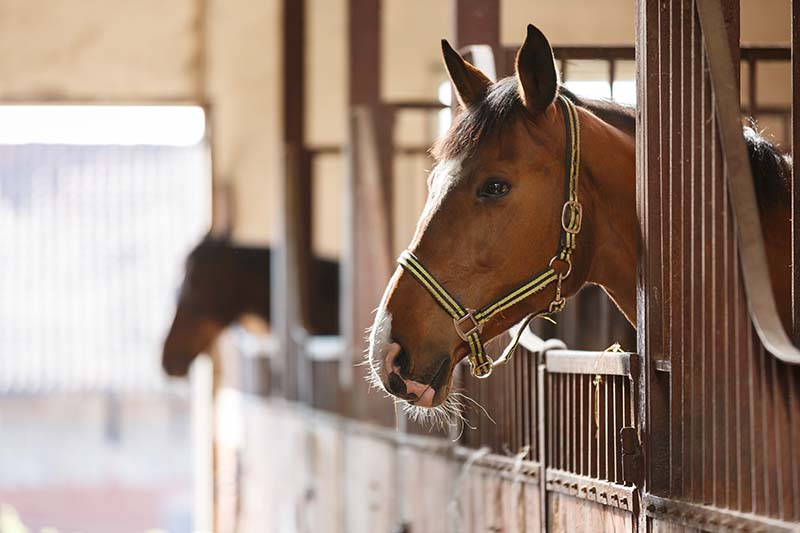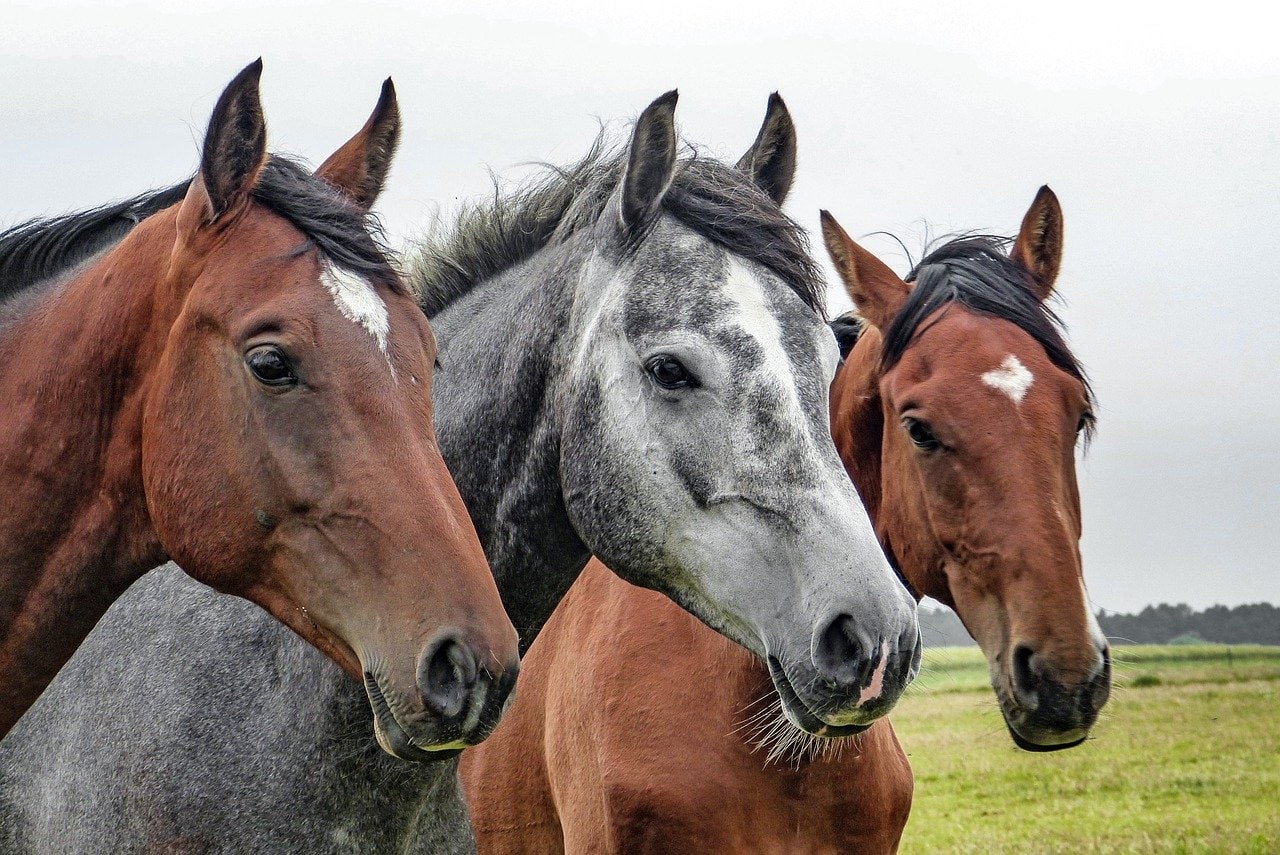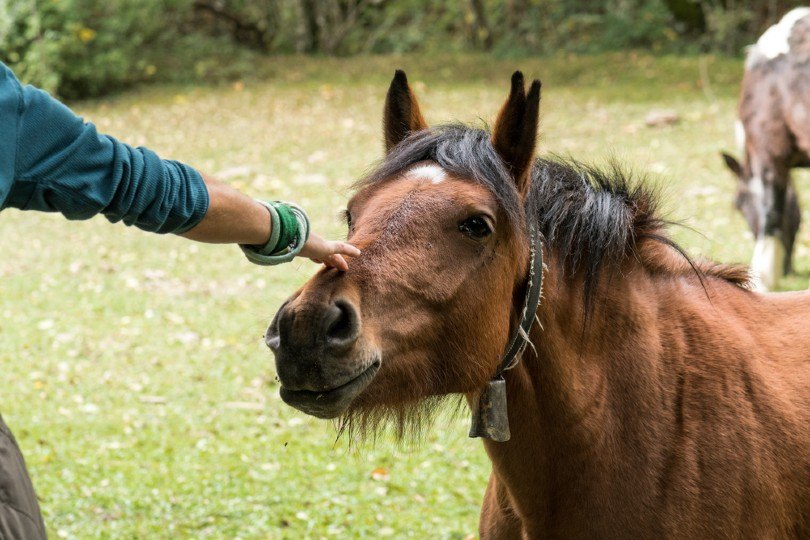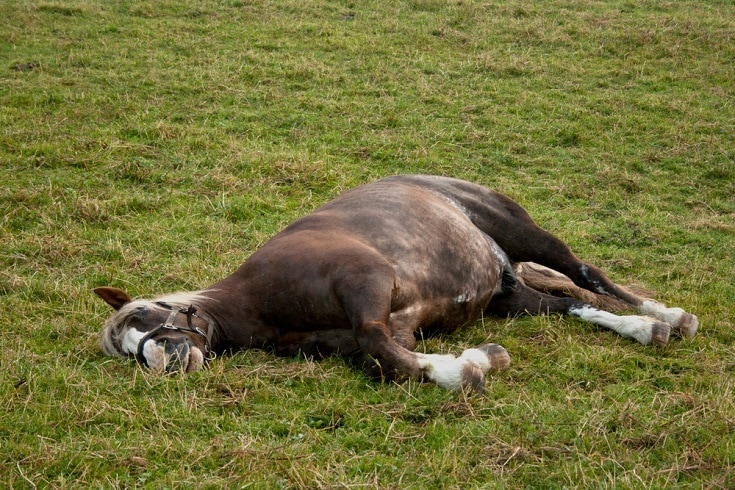
Click to Skip Ahead
Spend enough time around horses and you’re sure to see a bout of colic at some point. It’s a rather common equine digestive disorder with a wide range of causes. Colic can be a minor issue or a life or death situation, so, every case of colic should be treated immediately and as if it were a very serious matter, for it just might be. Because it’s a prevalent problem, you should be armed with the information necessary to diagnose, treat, and even prevent colic in horses.
What Is Colic?
Colic just means abdominal pain. Obviously, this makes it a pretty broad term. Colic can have many different underlying causes, which is why you should always treat it like it’s a potential emergency. Sometimes colic can be cured with just one dose of medication. But other times, it’s so bad that euthanasia is necessary.
Reasons Why Colic Develops
Though there are several possible underlying causes for colic (which we will discuss shortly), they all lead to pain via one of the following ways:
At times, colic can result from a combination of more than one of these factors.

The 8 Possible Causes of Colic in Horses
Because colic has so many different potential causes in horses, medical literature tends to categorize the type of colic that the horse is suffering in a more general manner. Here are some of the common causes of colic:
1. Inflammation of the Intestine (Enteritis or Colitis)
The term “enteritis” is used to describe an inflammation of the small intestine. Conversely, the term “colitis” is used to describe an inflammation of the large intestine. Both can lead to colic.

2. Inflammation of the Lining of the Abdominal Cavity (Peritonitis)
If the lining of the abdominal cavity itself is inflamed, the resulting inflammation is known as peritoneal inflammation, and in this case, though the gastrointestinal tract is usually not involved, the inflammation of the cavity itself produces colic.
3. Intestinal Strangulation (Strangulating Obstruction Colic)
If the intestines become entrapped or rotate on themselves, it will prevent feces and food from passing through and will even block the flow of blood.
4. Blood Supply Interruption (Non-Strangulating Infarction)
This happens when there’s no blood supply to the intestine, even if the intestine does not entrap itself.

5. Ulcers
When the lining of the gastrointestinal tract begins to erode, it can impede gastrointestinal function and cause pain.
6. Obstruction (Impaction Colic)
Several things, such as dehydration and worms, can cause fecal matter to harden up, which makes it harder to pass through the intestine and can easily cause blockages.
7. Excessive Gas (Flatulent Colic)
It seems incredibly simple, but if gas builds up enough, it will stretch out the intestine and cause discomfort or pain.
8. Unexplained Colic
At times, the cause of colic remains unknown, and horses randomly develop an episode even if there seem to be no physiological issues. Such episodes are categorized as unexplained colic. It is thought to be caused by stress (anecdotally, reasons can be as strange as not seeing their favorite person for a period of time), though the exact mechanisms of how this produces colic is still unknown.
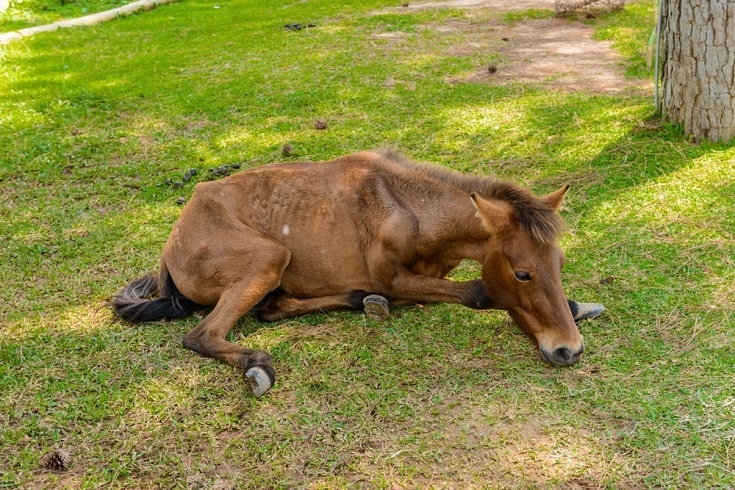
Horse Colic Signs
Throughout all the different causes and types of colic, the signs generally remain pretty similar. All of the following signs can be displayed on their own or in conjunction with a few other signs.
Please note that it is very rare for a horse to show all of these signs when experiencing an episode of colic. Therefore, the presence of just a few of these signs should warrant a call to your veterinarian. Although most of these signs indicate abdominal pain, none of them are able to pinpoint the location of the pain, and, therefore, your veterinarian will perform additional tests for a diagnosis.
Diagnosing Colic
For most horse owners, the main sign of a horse experiencing a colic episode are the refusal to eat and not acting like themselves. The signs of abdominal pain in horses are quite dramatic and relatively obvious. If you notice these signs in your horse, contact your veterinarian immediately.
If you have a stethoscope at hand and you’ve been trained by your veterinarian on how to use it, try to gather information about your horse’s pulse, respiration rate, and gut sounds, if possible. Likewise, if you have a thermometer and are knowledgeable about taking a horse’s rectal temperature safely, you can take this information for your veterinarian. It is best to not attempt this if your horse isn’t cooperating; a horse in pain can sometimes act unexpectedly.
Veterinarians diagnose colic by doing a physical examination, clinical evaluation, and performing necessary biochemical tests. Two main parts of the examination, which your vet will perform during any colic episode, are:
Both of these are incredibly important. A nasogastric tube is required because horses can’t vomit or regurgitate. Therefore, gas buildup in the stomach can lead to a fatal rupture. Passing a nasogastric tube can save your horse’s life.
Rectal palpation allows a veterinarian to assess your horse’s gastrointestinal tract to look for any abnormalities.
Your veterinarian may also opt for additional tests, such as bloodwork, ultrasound, and auscultation of your horse’s abdomen. With the findings of these tests, your veterinarian will come up with a diagnosis and treatment plan.
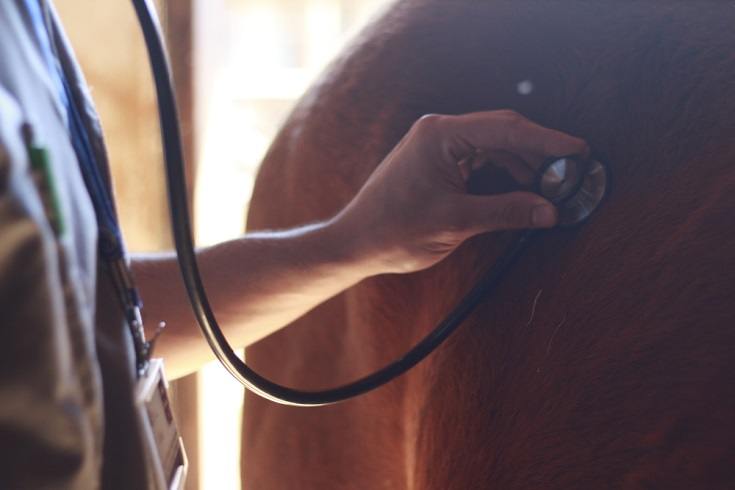
Treatment
Obviously, with the multitude of different types of colic and so many underlying causes, there has to be a wide range of treatments. Each type of colic will have a different manner of treatment, which is what can make colic so difficult to deal with.
The following are examples of treatments used. Your veterinarian may opt for more than one option for your horse.
Though most cases of colic can be cured, that’s not always so. In the worst cases, euthanasia is required.
Recovering From Colic
After a bout of colic has been treated, your horse is going to need to take it easy for a while. You’ll need to follow your vet’s advice carefully. They should advise you on what medications your horse needs to be taking and how often. Moreover, they should be able to inform you about the proper feeding levels and how to return to activities.
Make sure to keep a close eye on your recovering horse for any signs of abdominal pain. This could mean that the colic has returned or worsened.
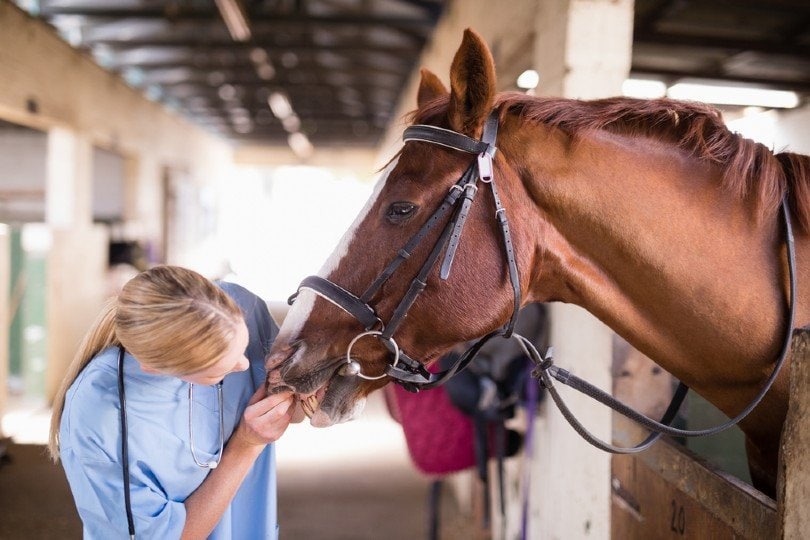
How to Prevent Colic
It isn’t possible to prevent all forms of colic; however, some basic preventative measures can help prevent some types of colic from occurring.
Dehydration can easily lead to colic, so you want to ensure your horse always has access to as much clean water as they need. This might require special consideration in the winter if you live in a cold region. Horses usually won’t drink ice-cold water, which is part of why they’re more likely to develop impaction colic in winter.
Your horse’s diet also plays a big role in gut health. Too much grain with too little roughage like hay or grass can be a cause of colic. By feeding your horse mainly hay or letting it graze and limiting the amount of grain or pellets it eats can go a long way toward preventing colic.
If your horse is unable to properly grind its food while chewing, the larger chunks can create blockages which can lead to colic. So, make sure to get regular dental checkups for your horse. If any of its teeth are missing or have sharp points, it could prevent your horse from chewing properly.
Internal parasites can also be a cause of colic. These vary in different regions and environments, so you’ll want to consult with your vet about the best way to control them. Regular deworming can also prevent the intestine from getting damaged and will be a major deterrent to colic.
Horses, like humans, are creatures of habit. If you throw off their schedule, it can cause undue stress that can lead to issues like colic. Try to keep their schedule consistent and only make changes gradually and with care.
Final Thoughts
Colic is an umbrella term that simply means your horse is experiencing abdominal pain. There is a wide range of root causes and just as many signs. You should try to remember the signs so you can always tell if a horse starts to develop colic. Sometimes, this condition is deadly. Horses who get the fastest intervention have the best chance of success. So, make sure you know how to check your horse’s vitals, remember the signs of colic, and always have the number of a veterinarian on hand who can help if things get serious.
Related Read:
- PSSM in Horses: What It Is, Symptoms, Can It Be Cured?
- Thrush in Horses: Signs, Causes & Treatment (Vet Answer)
Featured Image Credit: anjajuli, Shutterstock




